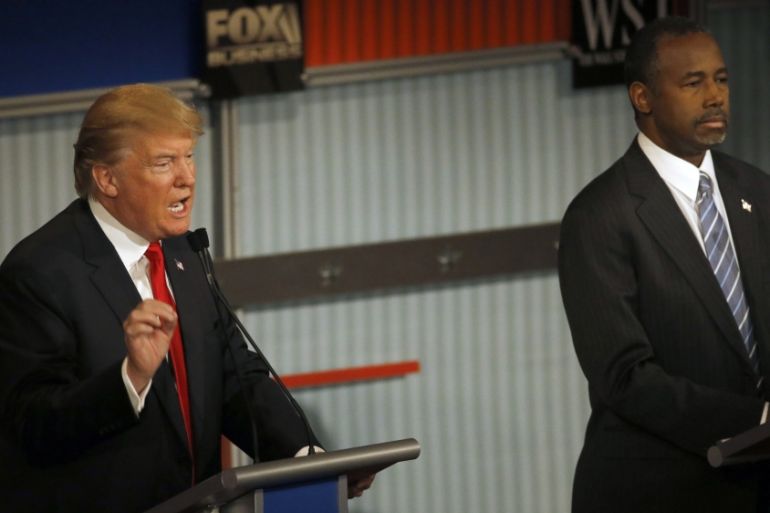Islamophobia of US candidates hits ‘9/11 hysteria’
US presidential candidates Donald Trump and Ben Carson criticised for employing rhetoric in wake of Paris attacks.

Rights groups have criticised American politicians’ comments about Muslims as a debate over the future of Syrian refugees in the United States intensified in the wake of the Paris attacks.
A poll conducted this week by Bloomberg Politics found that 53 percent of Americans oppose allowing Syrian refugees to resettle in the US.
Keep reading
list of 4 itemsPalestinian Prisoner’s Day: How many are still in Israeli detention?
‘Mama we’re dying’: Only able to hear her kids in Gaza in their final days
Europe pledges to boost aid to Sudan on unwelcome war anniversary
According to the Council on American Islamic Relations (CAIR), US leaders, among them influential presidential candidates, are “mainstreaming Islamophobic and unconstitutional policies”.
Comments made this week by two leading Republican presidential candidates drew the ire of rights groups who criticised them for anti-Muslim rhetoric.
|
|
| Republicans demand greater screening of refugees |
Donald Trump, who is leading in a recent NBC News poll among Republican voters, told NBC News on Thursday that he “would certainly implement” a database system for tracking Muslims.
“There should be a lot of systems, beyond databases,” he added. “We should have a lot of systems.”
Trump’s comments came a day after he was criticised for refusing to rule out special government-issued identification cards for American Muslims.
RELATED: Mosques vandalised as US states reject Syria refugees
The Republican front-runner had been asked by Yahoo News if Muslims should carry a form of special identification that noted their religion.
While talking about expanding surveillance measures on American Muslims, Trump said the US government “is going to have to look at a lot of things very carefully” and “look at the mosques”.
Such comments have a lasting impact on Muslims and other minorities in the US, CAIR spokesperson Robert McCaw told Al Jazeera.
McCaw said that American Muslims have been targeted by government surveillance programmes and intelligence agencies for years.
“The key difference is that Donald Trump would want to bring surveillance programmes like this out of the shadows and into the public with the intention of spying directly on American Muslims,” McCaw said.
“These are totalitarian ideas.”
Republican presidential hopeful Ben Carson, who is just behind Trump in the polls, was also criticised for likening Syrian refugees to rabid dogs.
“If there is a rabid dog running around your neighbourhood, you’re probably not going to assume something good about that dog. And you’re probably going to put your children out of the way.”
McCaw described Carson’s comments as “unthinkable”.
“It’s very clear what Carson meant,” he said. “There is only one thing you do with a rabid dog – and that’s put it down.”
“It makes American Muslims feel less secure,” McCaw said, adding that Trump and Carson “are using their positions as front-running candidates for the Republican party to marginalise American Muslims for their own personal and political gain”.
After the Islamic State of Iraq and the Levant (ISIL) group claimed responsibility for attacks in Paris that killed 130 people and wounded hundreds more, several legislators and governors moved to block the resettlement of Syrian refugees in the US.
RELATED: French Muslim Council asks mosques to decry ‘terror’
On Thursday, the House of Representatives passed a bill that would effectively halt the acceptance of any Syrian or Iraqi refugees. For the bill to be adopted, it will also have to pass the US Senate.
Earlier this week, governors of 31 states – only one of whom is not from the Republican party – declared that they intend to stop local state refugee resettlement programmes from accepting Syrian refugees.
Of the 10,000 Syrian refugees that US President Barack Obama has pledged to take in, some 1,500 have been admitted into the country so far.
Angelita Baeyens, programmes director for the Robert F Kennedy Centre for Justice and Human Rights, said the two presidential candidates’ comments, as well as the measures by American lawmakers, were “extremely frightening”.
“Sadly, it’s taking us back 14 years to the hysteria after the September 11 attacks,” she told Al Jazeera.
“Politicians’ Islamophobic and [anti-refugee] rhetoric has really escalated,” Baeyens said. “It causes people to support barring Syrian refugees.”
RELATED: Muslim residents of French city fear backlash
“Most people who aren’t familiar with these issues or working on these issues, when they hear influential people making statements over and over again, they end up believing that there is a threat to their safety.”
Several human rights groups have slammed the anti-refugee measures.
In a statement about the House bill that prevents the acceptance of Syrian and Iraqi refugees, the International Rescue Committee said that “it compromises the lives of people who are already some of the most victimised people in the world”.
Human Rights Watch accused US governors who moved to reject Syrian refugees in their states of using refugees as a “scapegoat”.
“The governors’ announcements amount to fear-mongering attempts to block Syrians from joining the generous religious groups and communities who step forward to welcome them,” the group said in a press release.